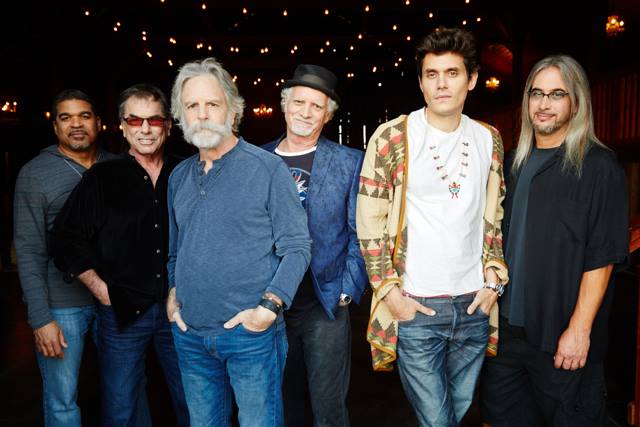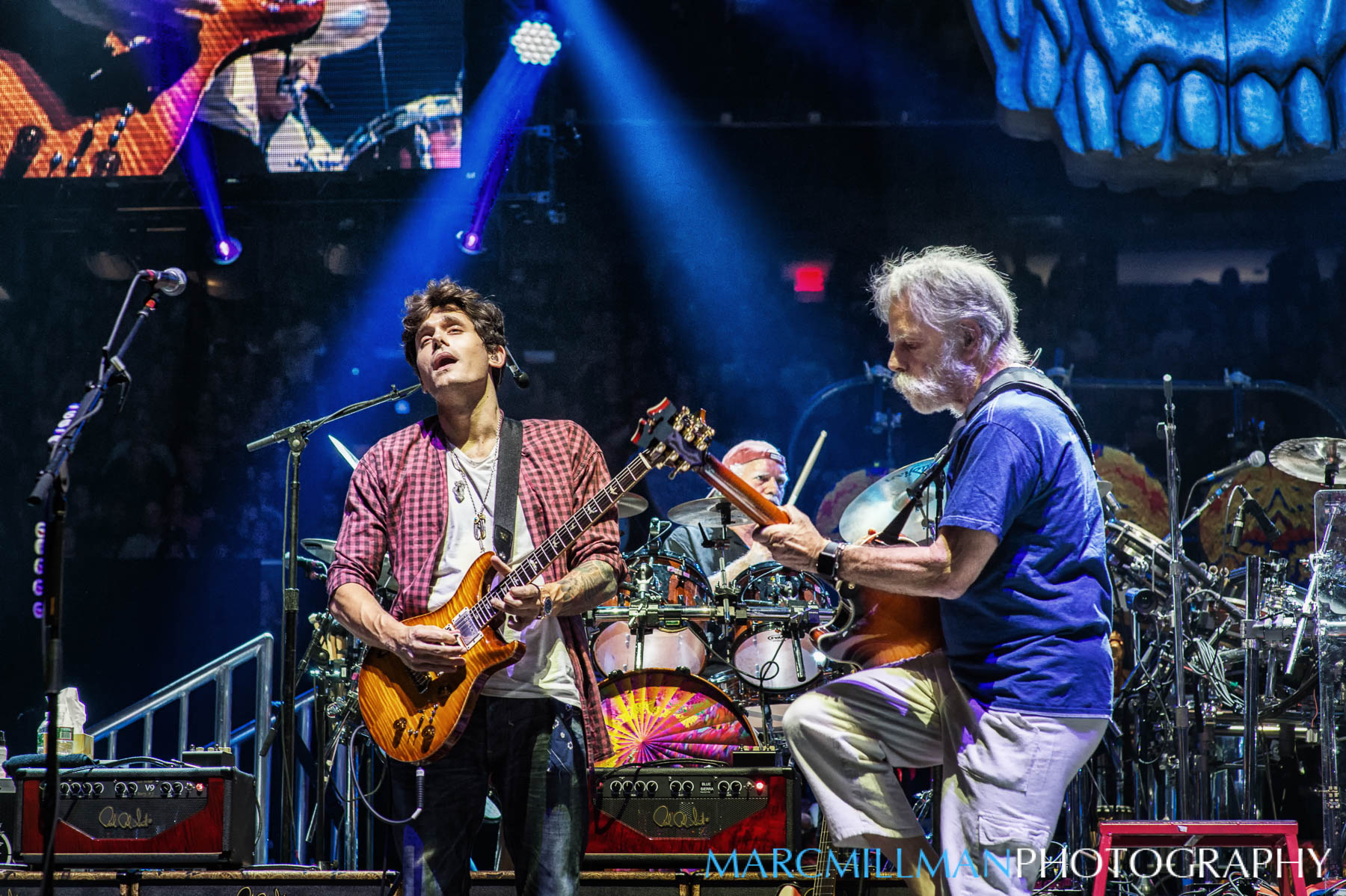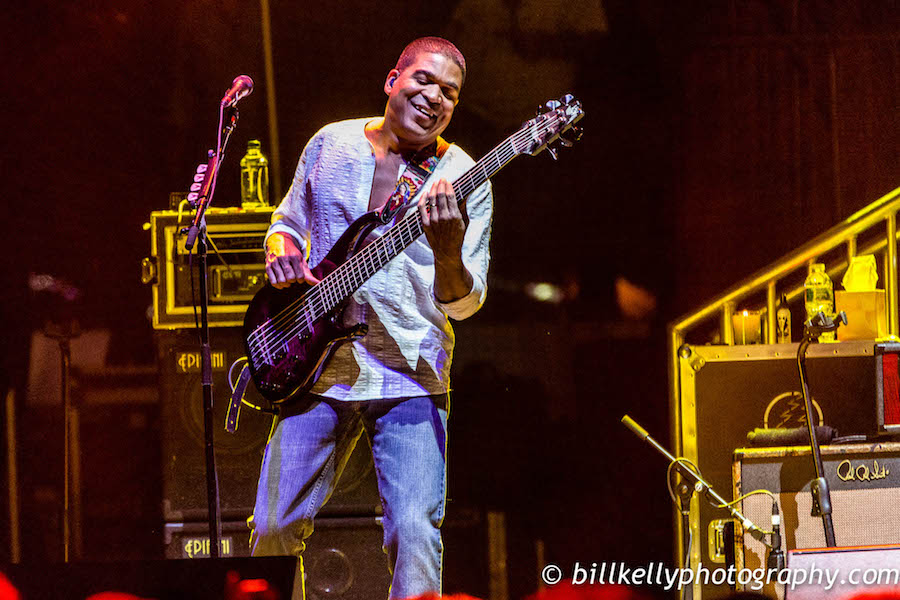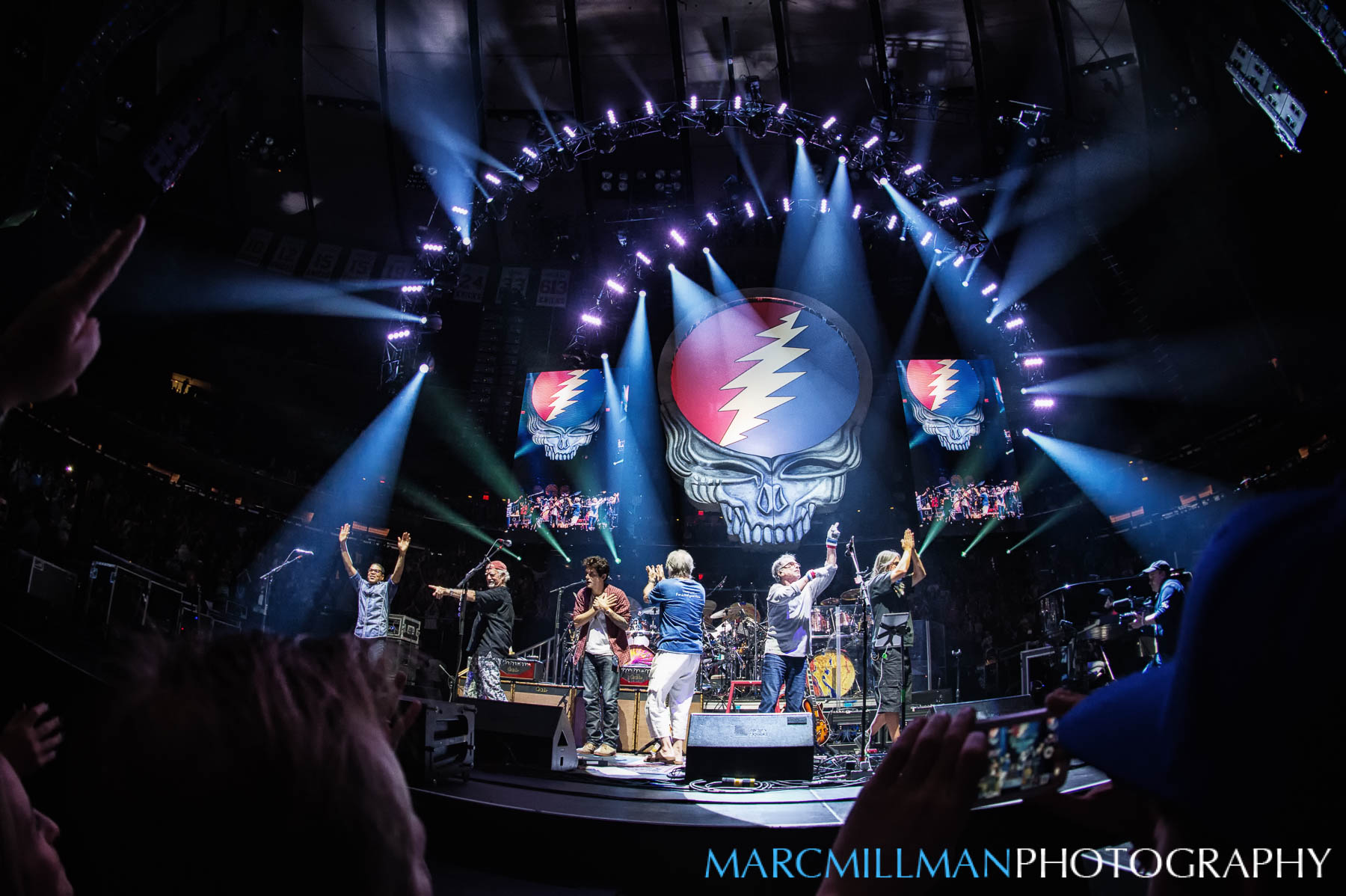The Core: Dead & Company

This story originally appears in the December issue of Relix. To subscribe, click here.
As Phil Lesh has mostly retired from full-time touring, Bob Weir, Bill Kreutzmann and Mickey Hart prove that the Grateful Dead’s music is built to last with the help of guitarist John Mayer, bassist Oteil Burbridge and keyboardist Jeff Chimenti.
Grateful Dead Leanings
Bob Weir: We were down at the Capitol Records building shopping for management last November and kicking around with Don Was in his office. Don mentioned that John was downstairs and a big fan, so he asked us if he could invite him up. We said, “Sure,” so John came up and we just hit it off. He included me on a TV show he was guest hosting, The Late Late Show, and it grew from there. I had listened to a little of his music before that—some of his Trio work [his blues group with bassist Pino Palladino and drummer Steve Jordan] in particular—but also some of his solo work.
Mickey Hart: We had heard that John had Grateful Dead leanings—that he loved that music—so he was very excited to be talking to us. We just clicked. This music really moved him, totally twisted his head for whatever reason. He got it. After Bob was onThe Late Late Show, he told us he felt good being around John, so we had a few rehearsals this spring and then another month of rehearsals this fall. It was one of the happiest, most joyful, most productive months I’ve ever spent with an ensemble. John was really bit by this thing, and it went viral. Some people get bit hard. He is younger then us, and he has this enthusiasm. He brings a lot of fresh energy to the circle. I think people will be surprised.
John Mayer: I was recording at Capitol Records, in Studio A, and I heard that Bob and Mickey were upstairs for a meeting. I went up and said, “I’m such a fan.” I had been listening to the Dead pretty much nonstop since I heard a version of “Althea” [and started digging in on SiriusXM] in 2011. I knew the radio songs like “Uncle John’s Band” before that, but I started digging deep into this music—we’ve been rehearsing nonstop for the last month.
Bill Kreutzmann: I haven’t talked to Phil at all recently, so I don’t have a comment on his thoughts, but I feel this is a nice follow-through from Fare Thee Well—a beautiful ride, a beautiful take-off from that band. We are taking that energy and putting it into this band, which is definitely a new band and a very good one, I’d like to add. Bobby told me that he liked John very much when he met him and thought that he would be a good fit for us to start something, and he was exactly right. From our first rehearsals, it was obvious to me that if we had all the right musicians, we could be a great band—not just a good band. John is taking this seriously. He must be working 20 hours a day to learn all this material.
A Well-Stretched Ear

MH: John has a well-stretched ear—he knows enough about enough different types of music to appreciate them. He’s also able to acclimate and become part of this ensemble because he’s committing to the music, not just playing solos. This music is about going with the rhythm, the flow. The notes are secondary. I’m not that familiar with John’s work, but I love playing with him. He doesn’t normally do this type of jamming, but he’s already loosening up and becoming more transcendent. I love hearing what he does with the songs. He’s been sleeping out behind the studio in his camper—dedicating himself to this material and getting the harmonies right. We have about 90 songs down at this point, and he plays the shit out of both the fast and the slow ones, like “Morning Dew.” He has a beautiful tongue. We are going to do all the chestnuts of course—“Fire on the Mountain,” “Uncle John’s Band,” “Playing in the Band,” “Althea.” “St. Stephen” has been a favorite for us. We just knocked out “In the Midnight Hour.” Little by little, other songs will appear during soundchecks.
JM: We are going to play all the [classic Grateful Dead songs]. We know that’s what people want. That’s what I want to hear. But we won’t know a lot of what we are going to do until we get to the arenas and are wearing hoodies onstage during soundcheck.
BW: For the most part, during our rehearsals, we’ve been focusing on the Dead songbook, but I am quite sure that once we hit the road, there is going to be a lot of back and forth— trading inspirations and source materials. The way John makes leaps in the registration of his arpeggiation is, often times, reminiscent of some of the stuff Jerry did. I haven’t heard many people do that—maybe one or two other guys—since Jerry checked out. And that has tickled me a little bit. I just haven’t heard other folks do that. You can tell he was paying attention to Jerry’s approach.
BK: From where I’m sitting, it’s great to see somebody that has this interest in learning the music. And not only just learning the songs, which is hard enough in itself, but putting his whole personality into it. “Slipknot” comes to mind as a song we’ve had fun with, but we’ve been skipping around to all [eras of our music] and even going back to the old Pigpen stuff. He has a great voice for that.
Rhythm Devils
MH: What you saw [during the Fare Thee Well drum segment] was just a taste of what’s to come this tour. We want to create a high-level, immersive experience. We are using Meyer PAs and working on new rhythmic compositions. There are twists and turns, and it’s all improvisational. It is the most developed Rhythm Devils we have ever had.
BK: Mickey and I actually had a full rehearsal just for that. We’re bringing a bunch of the same drums that we used at Fare Thee Well, which promises to be a lot of fun.

A Bass-Playing Bassist
BK: I was pretty insistent on bringing Oteil into the fold [after Mike Gordon, who was part of a few early rehearsals, was unable to join the band]. We played together in my BK3 trio and I knew he would do the Grateful Dead music exceptionally well. And, like John or Jeff—who is also an expert on this music—he played in his own style. It’s so important that somebody coming into this band grabs the music 100 percent. From there, they’ve got to add their own personality into it. For me, if you can’t add your own personality to the music, then it doesn’t work. The most important thing, to me, is that a musician is playing like themself, advertising themself— not just learning the songs. This is about more than copying the music.
MH: Oteil hadn’t paid much attention to [the Grateful Dead], though we knew him through the Allman Brothers. Phil is not a traditional bass player—he’s brilliant, but not in the sense of playing simple music. Oteil plays like a bass player. He breaks it down and makes it easy to play with, which is a different kind of virtuoso. His fingers are lightning-fast and I love playing with him. And I love playing with Phil, too.
Back in the Game
BK: I feel more on top of my game than I’ve ever felt, actually, and people I know quite well and trust think I’m playing the best I’ve played in a long time. That’s one benefit of playing so much recently and playing with different musicians. That old saying that “rust never sleeps” is quite true, so the more you can play, the better you can play. More than anything, after this month of rehearsing, I’m totally antsy. I keep saying to myself, “It’s tour time, ladies and gentlemen. It’s tour time!”
Robin Hoods
MH: Our free show at Madison Square Garden on [Nov. 7] is a biggie. We always like to give it away to the point that it is a little selfish—it’s always something we have done in the past. We would play free shows all the time, but it costs money to play for free. But New York has been so good to us and The Robin Hood Foundation was what locked us in. They have boots on the ground in New York, helping people who need it. MSG is like my home away from home, my living room. We have played there so many times. I see it as this very vibrant, intimate setting. We can feel the building sway from the stage.
Thoughts on GD50
JM: I am so into this music— I’m down the wormhole, learning this music—and I’m a fan just like everybody else. If people are skeptical, then I say, “Bring it on.”
BW: My appreciation of where our music and our offerings can take people has gotten a little deeper this year. I was always aware of our roots and that our music affected people, but bringing Trey [Anastasio]— and now John—up to speed on what it is that we are doing has deepened my appreciation of what we’ve been able to accomplish. There is an inspiration that we have been able to tap into and it is important to bring that to the songs. And that inspiration is there for any- one who wants to tap into it.




















